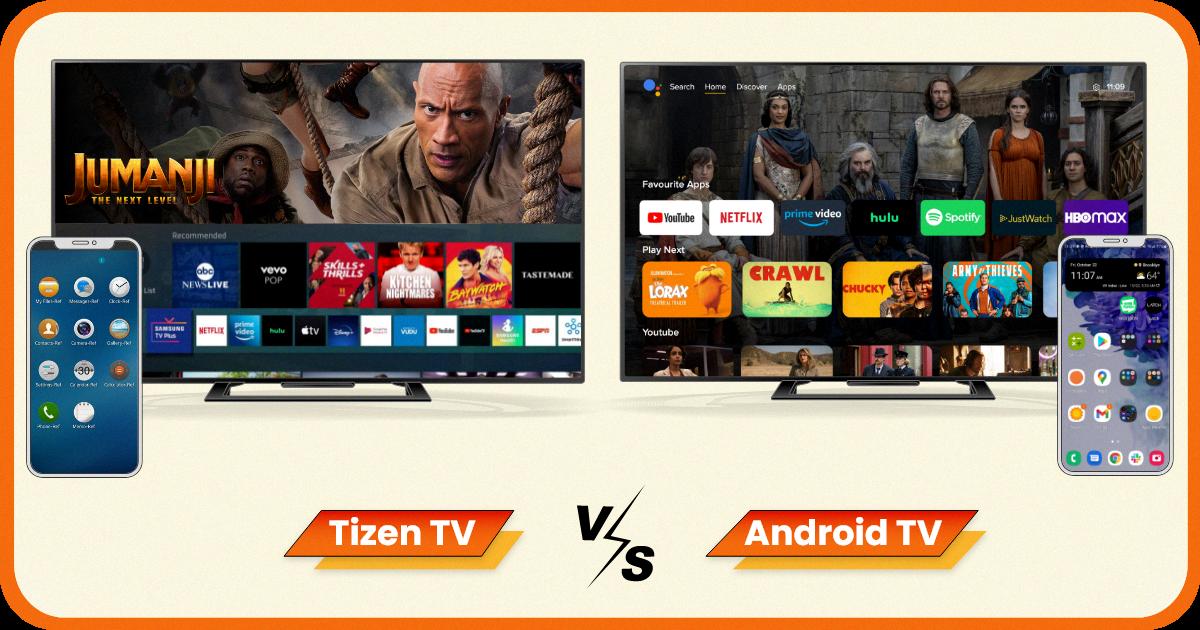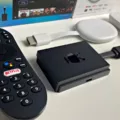When it comes to choosing a smart TV, there are two popular operating systems in the market – Tizen and Android TV. Both have their own strengths and weaknesses, so it’s important to understand the differences before making a decision.
Tizen, developed by Samsung, is known for its speed and lightweight nature. It has a 64-bit processor, which gives it an advantage in terms of faster start-up times compared to Android TVs. This means you can quickly access your favorite apps and content without any lag.
In terms of picture quality, Tizen also shines. It offers a superior viewing experience with vibrant colors and sharp details. This is particularly important for those who enjoy watching movies, sports, or playing games on their smart TV.
On the other hand, Android TV offers a more modern and versatile experience. It comes with a wide array of apps and features, making it a great choice for those who want a TV with a lot of options. The Google Play Store is available on Android TV, allowing users to download and install their favorite apps easily.
However, Tizen has its downsides too. It may require some customization, which can be challenging for non-tech-savvy individuals. Additionally, Tizen lacks an extensive app store, limiting access to certain apps and content. Some users also feel that Tizen is not as intelligent when it comes to smart suggestions or recommendations compared to Android TV.
Tizen and Android TV both have their own advantages and disadvantages. Tizen is faster, offers better picture quality, and is a reliable choice for basic TV viewing. On the other hand, Android TV provides a more modern experience with a plethora of apps and features. Ultimately, the choice between the two depends on individual preferences and needs.
Which Is Better Android TV Or Tizen?
When comparing Android TV and Tizen, it is important to consider several factors to determine which is better. Here is a detailed analysis of both platforms:
1. Start-up Speed: Tizen has an advantage over Android TV in terms of start-up speed. This is because Tizen is lighter in weight, resulting in faster boot times.
2. Processor: Tizen is equipped with a 64-bit processor, while Android TVs currently lack this feature. The 64-bit processor in Tizen enables faster and more efficient performance, which can enhance overall user experience.
3. Picture Quality: Tizen has been praised for its superior picture quality compared to Android TV. This is an essential aspect of television viewing, as a higher picture quality can provide a more immersive and enjoyable experience.
4. App Availability: Android TV benefits from the vast ecosystem of Android apps. It has access to a wide range of applications available on the Google Play Store. Tizen, on the other hand, may have a more limited selection of apps, as it uses its own app store called Samsung Apps.
5. Customization Options: Android TV offers more customization options compared to Tizen. Users can personalize their home screens, rearrange apps, and add widgets according to their preferences. Tizen, although it provides some customization options, may not offer the same level of flexibility as Android TV.
6. Integration with Smart Home Devices: Android TV has an advantage when it comes to integration with smart home devices. It can seamlessly connect with other Android devices, such as smartphones and smart speakers, allowing for convenient control and management of multiple devices within the ecosystem. Tizen, while it can integrate with Samsung’s own smart home devices, may have limitations when it comes to compatibility with other brands.
Tizen offers faster start-up speed, superior picture quality, and a 64-bit processor. However, Android TV has a larger app ecosystem, more customization options, and better integration with smart home devices. The choice between Android TV and Tizen ultimately depends on individual preferences and requirements.

Are Samsung Tizen TVs Good?
Samsung Tizen TVs are indeed good and offer a range of impressive features and capabilities. Here are some key reasons why Tizen OS is a dependable choice for smart TVs:
1. User-friendly interface: Tizen OS provides a user-friendly interface that is easy to navigate and offers a smooth and intuitive user experience. The interface is designed to be visually appealing and allows users to access their favorite apps and content effortlessly.
2. Extensive app library: Tizen OS comes with a wide variety of pre-installed apps, including popular streaming services like Netflix, Amazon Prime Video, and Hulu. Additionally, the Tizen app store offers a vast collection of apps, games, and entertainment options to enhance your viewing experience.
3. Smart features: Tizen OS is packed with smart features that enable users to connect their TVs to other devices seamlessly. This includes screen mirroring, allowing users to display content from their smartphones or tablets directly on the TV screen. Tizen also supports voice commands, enabling users to control the TV using voice recognition technology.
4. Multi-device integration: Tizen OS allows for seamless integration with other Samsung devices, such as smartphones and tablets. This enables users to easily share content between devices and control their TV using their mobile devices.
5. Excellent performance: Tizen OS is known for its smooth and responsive performance. The operating system is optimized to deliver fast and efficient performance, ensuring smooth playback of high-resolution content and quick app loading times.
6. Regular updates: Samsung regularly updates Tizen OS to improve performance, add new features, and enhance security. These updates ensure that your TV remains up to date with the latest technology advancements and provides an optimal viewing experience.
Samsung Tizen TVs offer a reliable and feature-rich smart TV experience. With a user-friendly interface, extensive app library, smart features, multi-device integration, excellent performance, and regular updates, Tizen OS provides a solid foundation for an enjoyable and convenient viewing experience.
Which Is Better Samsung Smart TV Or Android TV?
When comparing Samsung Smart TV and Android TV, it is important to consider your specific needs and preferences. Both options have their own set of advantages and features.
Samsung Smart TV:
– Samsung Smart TVs offer a user-friendly interface and are known for their high-quality displays.
– They come with pre-installed apps such as Netflix, Hulu, and YouTube, allowing you to easily access popular streaming services.
– Samsung Smart TVs also have voice control features, making it convenient to search for content or control the TV using voice commands.
– These TVs often come with additional features like screen mirroring, allowing you to mirror your smartphone or laptop screen on the TV.
– Samsung Smart TVs have a wide range of models with varying sizes and specifications to choose from, catering to different budgets and requirements.
Android TV:
– Android TV is a smart TV platform developed by Google, providing a more comprehensive and modern TV experience.
– It allows you to access a wide range of apps and services available on the Google Play Store, including popular streaming apps, games, and productivity tools.
– Android TV offers a customizable home screen, where you can pin your favorite apps or content for quick access.
– It also supports Google Assistant, enabling voice control and integration with other smart home devices.
– Android TV supports Chromecast, allowing you to easily cast content from your smartphone or other devices to the TV.
– Updates and software upgrades are generally faster and more frequent on Android TV compared to other smart TV platforms.
If you prefer a simple TV for basic viewing with pre-installed apps, Samsung Smart TV may be a suitable choice. On the other hand, if you want a more modern experience with a wide range of apps and customization options, Android TV would be a better option. Consider your specific needs, budget, and desired features when making your decision.
What Are The Disadvantages Of Tizen OS?
There are several drawbacks to using Tizen OS:
1. Customization Complexity: Tizen can be challenging for individuals who are not tech-savvy. It may require a significant amount of customization, making it difficult for beginners to navigate and set up.
2. Limited App Store: One major disadvantage of Tizen is the absence of an app store. This lack of access to a wide range of applications may limit users’ ability to download and use their favorite content or services.
3. Intelligence and Recommendations: Some users have expressed dissatisfaction with Tizen’s intelligent features. In comparison to other operating systems like Android, Tizen may not offer as advanced smart suggestions or recommendations. This can be a drawback for users who rely on such features for a more personalized experience.
4. Developer Support: Tizen may not have as strong a developer support community compared to other operating systems. This could lead to fewer updates, fewer app options, and potentially slower bug fixes, which may impact the overall user experience.
5. Limited Device Compatibility: Tizen is primarily used on Samsung devices, which limits its compatibility with other brands. This lack of widespread adoption may restrict users’ choice of hardware and limit their ability to switch between different devices seamlessly.
6. Market Share: Tizen has a relatively small market share compared to other operating systems like Android and iOS. This can result in fewer updates, less support from third-party developers, and potentially limited innovation in terms of new features and functionalities.
While Tizen offers some unique features and benefits, such as improved security and performance on Samsung devices, it also has several disadvantages. These include customization complexity, limited app store availability, perceived intelligence shortcomings, limited developer support, limited device compatibility, and a smaller market share compared to its competitors.
Conclusion
When comparing Tizen and Android TV, it is evident that both operating systems have their strengths and weaknesses. Tizen offers a faster start-up time, thanks to its lightweight nature, and comes with a 64-bit processor that is not yet available on Android TVs. The picture quality on Tizen is also superior, providing a better overall viewing experience.
On the other hand, Android TV offers a more modern experience with a wide range of apps available for download. It provides a more customizable interface and is generally more user-friendly, making it a better choice for those who prefer a more advanced and app-centric smart TV experience.
However, Tizen can be challenging for non-tech-savvy individuals, as it may require more customization and lacks an app store, limiting access to certain content. Some users also claim that Tizen is not as intelligent when it comes to smart suggestions or recommendations compared to Android.
Ultimately, the choice between Tizen and Android TV depends on individual preferences and needs. If you prioritize speed, picture quality, and a simpler interface, Tizen may be the better option. On the other hand, if you value a wider range of apps and a more customizable experience, Android TV may be the preferred choice. Consider your specific requirements and decide which operating system aligns best with your preferences for a smart TV.




